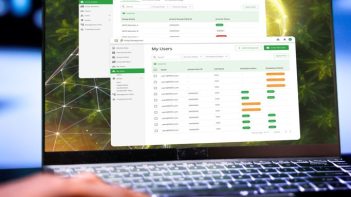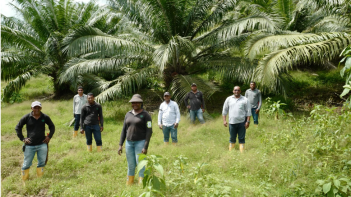There were days when Habibah Ketui’s children would cry of hunger and sleep on an empty stomach. Sometimes, they had to walk for miles on a bad road to get to school, as they could not afford to ride on the school bus. Life was undoubtedly hard for Habibah as she and her husband struggled to make ends meet, back in the 90s.
She owned the land here in Sabah, Malaysia, handed down by her father in 1977. Although she knew that investing in her land would not go to waste, Habibah was at a loss on how to do this initially.
It was only decades later, with the help of her husband, that they cleared the land and began farming coffee, rice and fruit trees.
A challenging beginning
At that time, they were only making RM400 (USD 90) a month, when coffee was selling at RM4 per kilo. Since they didn’t own a vehicle, they suffered from an unsold surplus of product. Her 7-year old daughter, Junairah, would take the surplus of fruits and vegetables to sell at her school for supplementary income.
After about 3 testing years, Habibah started hearing about palm plantations and witnessing other farmers doing it. In 1999, she decided to jump on the bandwagon.
Palm oil, the investment that paid off
It took her about 8 years of patience, perseverance and hard work before her family income began increasing, and her family’s life was significantly changed. Based on her experience, oil palms are easier to grow, as they are more hardy and reliable compared to what she cultivated previously. Because the collection centres for fresh fruit bunches were close to her home, it made it much easier for Habibah to transport and sell her produce.
She also learned that it was much easier for her to yield profit as many businesses purchase fresh fruit bunches. This makes investment in oil palm planting more profitable.
A new opportunity
Habibah came across the Wild Asia Group Scheme for Small Producers (WAGS) in 2015 and found out that she could receive training to manage her farm and produce better. Through the training, Habibah learned how to use better fertilizing techniques rather than blanket spraying. This resulted in improved soil and much better fruit quality. Habibah went on to get certified by the RSPO in October 2015, just nine months of joining WAGS.
Within a year, she started seeing the benefits of certification: a 20% increase in farm yield with a 60% decrease in her costs, which translated into an improved profit margin.
For now, the only challenge that Habibah is facing is the lack of connection to a certified mill. She is also not able to get a premium price for her produce yet. Far from giving up, she is continuously looking for new ways to increase her yields and manage her farm well for at least another 5 years.
Habibah’s drive to grow herself and her efforts to get certified are paying off. She enjoys the experience and mutual support she gets from being part of WAGS and the community of small producers. Even after WAGS is long gone, Habibah will continue to be certified as a palm producer and to enjoy the benefits that she currently benefits from.
With the hope that her children and grandchildren will not sell her land after her time, Habibah continues to aspire to gain a sustainable living for her family.
Keep reading

Access into prisma

Updated Trace Function in prisma

Call for Expression of Interest: Independent Investigation of a Complaint

Latin American Smallholders, Key Global Brands Gather in Peruvian Amazon to Advance Sustainable Palm Oil

RSPO Forum for Members and Certification Bodies 2025: Strengthening Capacities and Building Bridges with RSPO Members

From Violence to Prosperity: Cultivating Sustainable Palm Oil in San Pablo, Colombia

Palmas de Tumaco: Enduring, Trusting, and Transforming in Colombia’s Pacific Coast
Carry Over Credits for Certified Independent Smallholder Groups




